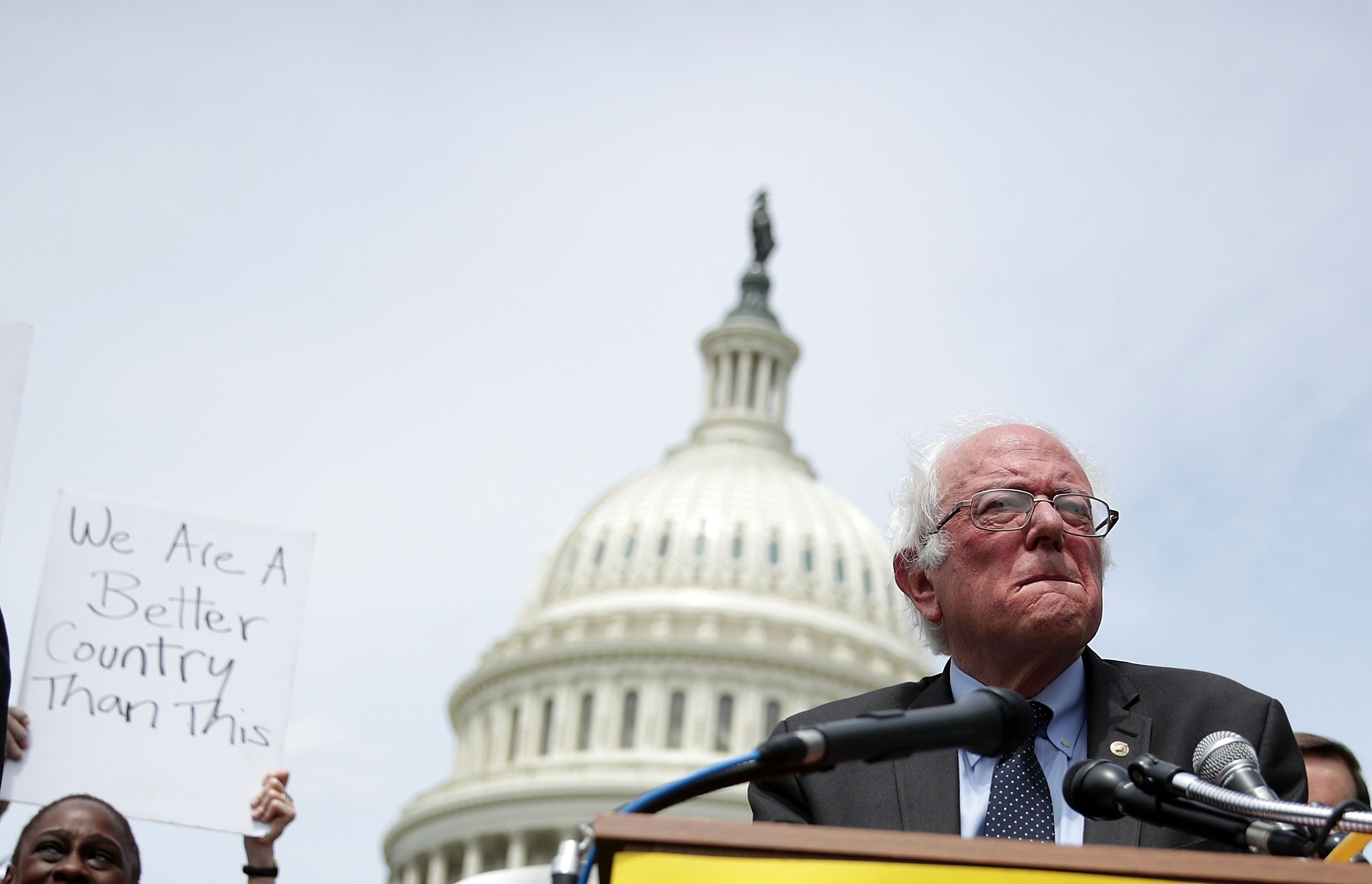How Democrats can win over moderate Republicans
A straightforward plan to win friends and influence people


A free daily email with the biggest news stories of the day – and the best features from TheWeek.com
You are now subscribed
Your newsletter sign-up was successful
The Democratic Party has spent much of the six months since Hillary Clinton's crushing defeat mired in an existential crisis. Republicans are ascendant at all levels of government, while Democrats seem at an utter loss to agree on their future course, platform, and leaders.
And yet, Democrats also have a fantastic opportunity. The GOP might control the White House and Congress, but millions upon millions of Americans are really unhappy with President Trump and the Republican-dominated legislative branch. Democrats may be defeated and in disarray, but they also have an obvious opening as the only viable alternative to an unpopular GOP.
Democrat Jon Ossoff won plaudits for firing up his fellow Democrats in Georgia's 6th congressional district (and across the country while he was at it). But he also attracted 8 to 10 percent of Republicans' votes in last month's election. That suggests that Democrats can win moderate Republican voters disappointed with Trump without sacrificing their soul and losing their base.
The Week
Escape your echo chamber. Get the facts behind the news, plus analysis from multiple perspectives.

Sign up for The Week's Free Newsletters
From our morning news briefing to a weekly Good News Newsletter, get the best of The Week delivered directly to your inbox.
From our morning news briefing to a weekly Good News Newsletter, get the best of The Week delivered directly to your inbox.
The recipe for Democrats ought to go something like this: a Bernie Sanders-style economic policy that's generous to working-class and poor Americans; reform-minded positions on foreign policy, the surveillance state, and prisons; and more nuance on abortion.
Let's start with abortion, since this is obviously the most controversial suggestion. Many on the left flipped out when Sanders campaigned for pro-life Democrat Heath Mello in Nebraska last month. Loads of zealously pro-choice Democrats believed Mello shouldn't receive any party support, raising the question of whether Democrats are necessarily pro-choice, or whether they have room within their ranks for pro-life voters.
Pew Research Center has shown that about 3 in 10 Democrats believe abortion should be illegal in all or most cases. A Fox News poll last year put the number at 27 percent. African Americans and Latinos, both core Democratic constituencies, both lean conservative on this issue, with 35 percent of blacks and 49 percent of Latinos "saying abortion should be mostly illegal." And at least 60 percent of Americans believe abortion should be outlawed after the 20th week of pregnancy.
It ought to be no surprise, then, that House Minority Leader Nancy Pelosi, doggedly pro-choice as she is, has called on Democrats to be more flexible on abortion. Democrats can still be pro-choice without advocating for late-terms abortions, or touting abortion as an unequivocal public good. Using federal dollars to pay for abortions is a controversial practice, one that a majority of Americans do not support. Seeking to repeal the Hyde Amendment (which bars the use of federal money for abortions) in 2016 damaged Democrats' relationship with pro-life voters.
A free daily email with the biggest news stories of the day – and the best features from TheWeek.com
Now, I'm not suggesting that Democrats abandon their deeply felt position on abortion. I'm merely suggesting some very mild compromises. If Democrats want to win, they should welcome pro-life voters into the Democratic tent. Some of it is just rhetorical: Don't tell a pro-lifer that anyone who opposes abortion is unwelcome in the Democratic Party. But some of it involves small policy concessions, too. Giving a few inches on the more extreme elements of liberal abortion policy could gain Democrats miles of new supporters.
Next up: foreign policy. The Democrats' embrace of hawkishness has done the party much harm with a war-weary electorate in recent years. Hillary Clinton was a particularly guilty case: Not only did she support the war in Iraq, she pushed for U.S. engagement in nearly every conflict since.
Americans have become all too familiar with the consequences of these incessant engagements. Military families are torn about by deployments. The cost of constant war continues to balloon. This is where Trump stepped in to fill a gap: He didn't just advocate for working-class Americans at home — he promised to de-escalate some of America's overseas commitments, too.
Unfortunately, Trump hasn't demonstrated the consistency he promised. From missiles strikes in Syria to military raids in Yemen, a MOAB bombing in Afghanistan to alarmingly militaristic comments on North Korea, Trump seems to be embracing a "tough guy" approach to foreign policy. And a majority of American's just don't want that. Two out of three Americans think the U.S. should be less involved in Middle Eastern regime change; only 13 percent think our government ought to promote democracy abroad. In 2014, the Chicago Council on Global Affairs found that 41 percent of poll respondents thought we should stay out of other countries' affairs.
Democrats needn't be isolationist. Some polls suggest that the U.S. electorate wants a more militaristic response to ISIS than it desires in other countries. But questioning our foreign policy hawkishness, and replacing it with a prudent and measured stance on military engagements abroad, seems vital for the future. It's something military families want (speaking as a military wife, myself). It is something that increasingly has bipartisan support. And it helps us focus on the problems plaguing our own house, so to speak.
Speaking of problems at home: Democrats should embrace criminal justice reform across the board, and begin promoting their efforts on these issues on a national stage. Criminal justice reform is not just about reforming our prison system, although that's a vital and pivotal aspect of it. It's also about cultivating an approach to domestic security that's prudent, communitarian, and smart. It's about fighting the opioid crisis through means other than violence and imprisonment, wherever possible. And it's about pushing for reconciliation in neighborhoods viciously torn and tossed by violence. This is something many Democrats are already doing — and conservatives increasingly feel drawn to these issues. Democrats can emphasize and promote these efforts to great effect.
Sixty-nine percent of voters believe it's important for the country to reduce mass incarceration — including 81 percent of Democrats, 71 percent of Independents, and 54 percent of Republicans. And 87 percent of respondents believed that the drug-addicted and mentally ill should not be placed in prison. In a poll conducted by Legal Action Center, nearly three-quarters of voters favored sentencing reform.
Sadly, Trump doesn't appear to be pushing for these things. If Democrats can embrace this issue, and advocate for it winsomely, they'll build a great case for their party.
And then there's the surveillance state. The NSA recently announced that it would halt its controversial email surveillance program. Edward Snowden first reported the program in 2013, and the NSA has undergone severe censure from politicians on both sides of the aisle since. But this fight is a prolonged one.
While battling against federal surveillance has a libertarian streak to it, many Americans on the left are similarly worried about the injustices inherent in such techniques. A majority of Americans disapprove of U.S. collection of telephone and internet data as part of counterterrorism efforts. Seventy-four percent of voters said they shouldn't have to give up privacy and freedom in exchange for safety, and over a quarter said they've changed their technological habits following the Snowden leaks.
Promoting this stance could draw a larger swath of voters to the Democratic Party — especially as we see Trump advocating for more policing of average citizens, not less.
Do these policy positions fit within the Democrats' larger ethos? Definitely. Each seeks to temper the injustices that can be done by an inflated, uncontrolled power. Each is about defending "the little guy." That fits with Bernie's economic populism. It fits with Democrats' compassionate stance on issues like poverty. And it meshes with their platform much better than Wall Street cronyism, foreign policy hawkishness, or advocacy for late-term abortions.
What's more, these are issues a lot of right-leaning voters could rally behind. Fiscal conservatives may still be loath to support Sanders' economic populism. But if Democrats help reform our criminal justice system and fight the surveillance state, they help temper other government programs. It may be an imperfect relationship. But in many ways, it's more consistent and appealing than the one conservatives find themselves in.
Gracy Olmstead is a writer and journalist located outside Washington, D.C. She's written for The American Conservative, National Review, The Federalist, and The Washington Times, among others.
-
 Properties of the week: pretty thatched cottages
Properties of the week: pretty thatched cottagesThe Week Recommends Featuring homes in West Sussex, Dorset and Suffolk
-
 The week’s best photos
The week’s best photosIn Pictures An explosive meal, a carnival of joy, and more
-
 The ‘ravenous’ demand for Cornish minerals
The ‘ravenous’ demand for Cornish mineralsUnder the Radar Growing need for critical minerals to power tech has intensified ‘appetite’ for lithium, which could be a ‘huge boon’ for local economy
-
 The billionaires’ wealth tax: a catastrophe for California?
The billionaires’ wealth tax: a catastrophe for California?Talking Point Peter Thiel and Larry Page preparing to change state residency
-
 Bari Weiss’ ‘60 Minutes’ scandal is about more than one report
Bari Weiss’ ‘60 Minutes’ scandal is about more than one reportIN THE SPOTLIGHT By blocking an approved segment on a controversial prison holding US deportees in El Salvador, the editor-in-chief of CBS News has become the main story
-
 Has Zohran Mamdani shown the Democrats how to win again?
Has Zohran Mamdani shown the Democrats how to win again?Today’s Big Question New York City mayoral election touted as victory for left-wing populists but moderate centrist wins elsewhere present more complex path for Democratic Party
-
 Millions turn out for anti-Trump ‘No Kings’ rallies
Millions turn out for anti-Trump ‘No Kings’ ralliesSpeed Read An estimated 7 million people participated, 2 million more than at the first ‘No Kings’ protest in June
-
 Ghislaine Maxwell: angling for a Trump pardon
Ghislaine Maxwell: angling for a Trump pardonTalking Point Convicted sex trafficker's testimony could shed new light on president's links to Jeffrey Epstein
-
 The last words and final moments of 40 presidents
The last words and final moments of 40 presidentsThe Explainer Some are eloquent quotes worthy of the holders of the highest office in the nation, and others... aren't
-
 The JFK files: the truth at last?
The JFK files: the truth at last?In The Spotlight More than 64,000 previously classified documents relating the 1963 assassination of John F. Kennedy have been released by the Trump administration
-
 'Seriously, not literally': how should the world take Donald Trump?
'Seriously, not literally': how should the world take Donald Trump?Today's big question White House rhetoric and reality look likely to become increasingly blurred
